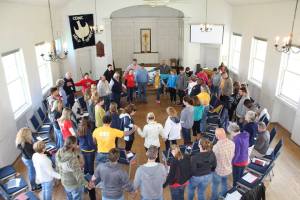As a people, we get in our own way a lot. We make ourselves so busy, so manic, so overscheduled, and so quick to be heard that we rarely listen. And what and to whom we listen are often suspect.
“[A]lmost nothing important that ever happens to you happens because you engineer it. Destiny has no beeper; destiny always leans trenchcoated out of an alley with some sort of ‘psst’ that you usually can’t even hear because you’re in such a rush to or from something important you’ve tried to engineer.”
David Foster Wallce, Infinite Jest
I dig David Foster Wallace’s image of destiny leaning out of the alley, but we’re too busy to hear it. And the reason destiny, the big, epic, cool, yummy ideas and things that could fill and direct our lives, is left hanging out in the alley is that we’ve unknowingly designed the cities that are our lives and that is the space we’ve often left the stuff that might really matter.

Yesterday (Ash Wednesday) was the beginning of Lent. In N.T. Wright’s devotional book, “Lent for Everyone: Matthew, Year A,” he gives us a reading and some thoughts each day of the season. He begins with reminding us that when God does something new, he often involves unlikely, frequently surprised or alarmed people:
“He asks them to trust him in a new way, to put aside their natural reactions, to listen humbly for a fresh word and to act on it without knowing exactly how it’s going to work out… we may have to put our initial reactions on hold and be prepared to hear new words, to think new thoughts, and to live them out.”
I wonder if destiny isn’t the only thing we’ve shoved in the alley; I wonder if we’ve put grace there too. As we head into Lent and look for fresh words, new thoughts, and seasonal and spiritual renewal–maybe grace leans out of the alley to remind us it is there for the taking, our taking, our lives, and our hearts.
Preaching at an Ash Wednesday service at Christ Church Easton, Fr. Bill Ortt put it like this:
You are loved
You are forgiven
God wants his grace to be a part of your life.
And he quoted Psalm 90, which says, “Teach us to number our days, so that we might apply our hearts to wisdom.” (verse 12, KJV)
Mortality has loomed large in our community lately. We don’t need reminders. But that is one thing that Ash Wednesday does for us anyway. We come from dust and to dust we shall return. So we need to use the time we have the best we can. In numbering our days, we feel and learn the urgency and necessity of wisdom.
Allowing grace to speak to us, allowing grace into our lives, living into forgiveness so that we can let go of our past and be present now, and step towards what will be.

After Ash Wednesday services, I headed to Children’s Hospital in DC, where younger daughter Ava is staying for a few days for tests and observation to see if they can learn more about her seizures and spells. As we’re sitting in her room after breakfast, she puts on “Into the Spider-Verse,” a movie we both love.
Miles Morales is a young teenager in a new school and he doesn’t have a clue how he fits in or who he is supposed to be. After he tries to fail his way out of the school, his physics teacher calls him out and assigns him an essay.
“I’m assigning you an essay, not about physics, but about you and what kind of person you want to be.”
That’s a question we need to continually ask ourselves; an ongoing conversation. During the course of the movie, Miles finds his own way, not the way that the other Spider-Men and Women have, but a way that is his. He takes the book “Great Expectations,” turns it into street art of “No Expectations,” and lives into his personal destiny.
Maybe grace is how we get to our destiny. Maybe by reconciling and letting go of our past and the world’s designs for who we are supposed to be, and stepping into God’s grace, forgiveness, and vision for us, we can become who we are meant to be.

“My name is Miles Morales. I was bitten by a radioactive spider, and for like two days, I’ve been the one and only Spider-Man. I think you know the rest. I finished my essay. Saved a bunch of people…. And when I feel alone, like no one understands what I’m going through, I remember my friends who get it. I never thought I’d be able to do any of this stuff, but I can. “
Through God’s grace, we can. So when destiny, clothed in grace, leans out of the alley, stop, lean in, and listen.






























